
 |
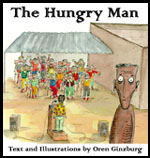 |
The
Hungry Man Text and Illustrations by Oren Ginzburg, 2004 (120 words, 17 pictures) |
|
|
|
||
|
|
||
|
|
||
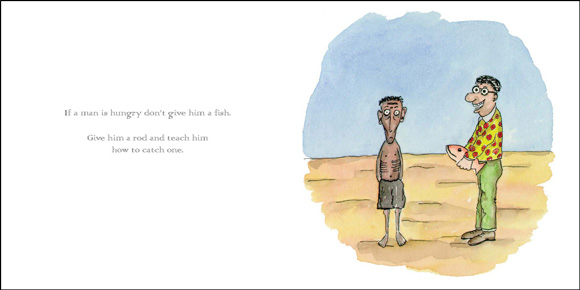 |
||
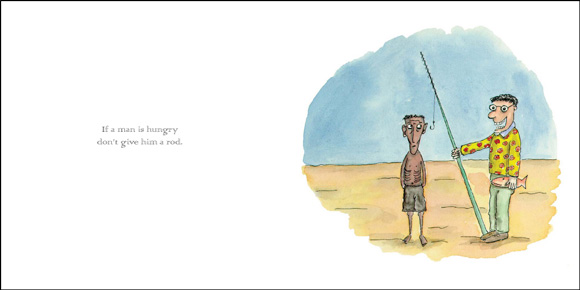 |
||
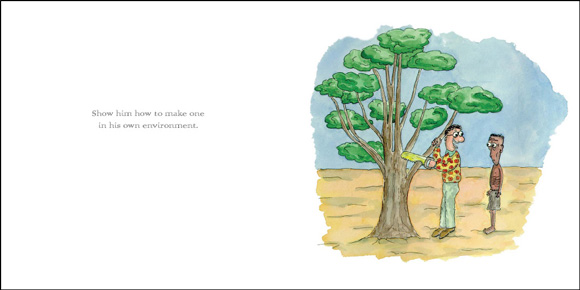 |
||
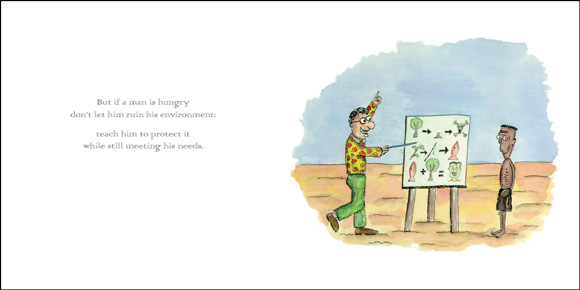 |
||
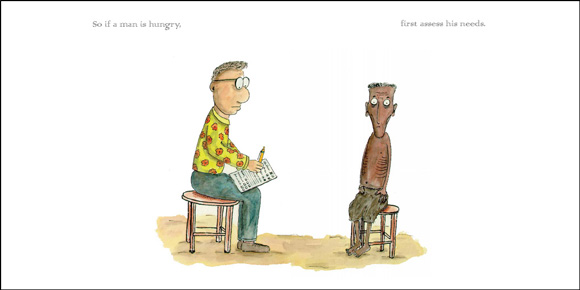 |
||
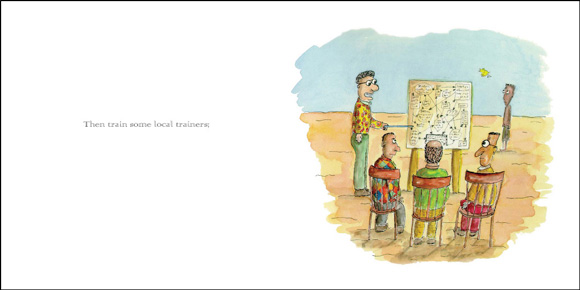 |
||
|
etc. etc. etc.
|
||
|
"This may be a slim little cartoon book, but it packs a powerful message: the vast amounts of money and human resources which go into aid programmes are very often misplaced. In a sequence of funny but illuminating watercolour drawings, which hardly need their skinny captions, Ginzburg deftly reveals how the plight of a 'hungry man' (as a representative of a community) so often attracts a horde of well-meaning expats which rapidly become a self-serving institution. Himself a committed aid worker, Ginzburg fires a sharp shot at his own community. Few will doubt the hard work and personal sacrifice made by aid workers in Africa, and other parts of the 'developing world' ? and we have certainly seen the power of participation in the recent tragic events of the south Asia tsunami ? but if this little book causes some individuals and organisations to reflect a little closer on what they are doing, it will have served its purpose." |
||
 |
||
|
"The funniest book on Development I have ever read" - Save the Children, Bangkok "This should be made mandatory reading" - UNICEF, Bangkok "How can I quote the book in my PhD thesis?" - PhD Candidate, Australia "You stole my idea!" - UN Agency, Cairo "I have given a copy to each of our donors" - NGO Worker, Cambodia "This is scary" - USAID "I'm sure you hear this
all the time, but I really do have to tell you that The Hungry Man struck
a chord with me. I was introduced to the book a couple days ago, at the
first class of a graduate course at the Yale School of Forestry and Environmental
Studies (FES) called "Society and the Environment." The first
thing the professor did was go through the book with the whole class. |
||
 |
||
|
1. Mr. Ernest Turnip --- Ernest Turnip <Ernest_Turnip@yahoo.com> a écrit : Sawadees, Mr. Ginzburg, My wife and I were reading
your amusing "The Hungry Man." We wish to respectively point
out that although it's splendid to do all the things you suggest, the Kop kun kap,
--- Oren Ginzburg oren_ginzburg@yahoo.com wrote: Sawasdee! Thanks for your e-mail. I think that's exactly the point of the book - that "Development" is now all about processes, but processes don't feed the hungry. All the Best, Oren
--- Ernest Turnip <Ernest_Turnip@yahoo.com> a écrit : No, you must first feed then teach. The strategy of teaching someone starving is failure. Ernest
--- Oren Ginzburg <oren_ginzburg@yahoo.com> wrote: Dear Ernest, Let me try one more time: The book needs to be understood as a funny take on a situation - a situation in which a "hungry man" is taught rather than fed. The premise of the book is that a hungry man should be fed. As a cartoon, the book makes fun of the attitude in which someone (in this case the development worker) launches into a complex process ("teaching" the hungry man, organising a workshop, etc) rather than simply feeding him. The book therefore advocates for feeding a hungry man rather than trying to go through lengthy (and in the end useless) processes. We could therefore say that the book criticises people who would supposedly "teach" a hungry man, do "advocacy", "train trainers", etc., rather than feed the man. The idea of the book is therefore the following: don't do all these things, don't get lost in processes: you should rather feed the hungry man first. Am I right in thinking that after reading the book, you have understood that it was advocating exactly the opposite message? In fact the book could be said to be "humorous" and "ironic" by saying one thing and taking it to the extreme in order to show that it doesn't work. In this case, the book shows that it does not work to launch into all these complex activities when all the hungry man really wants is to eat. You may also have noticed on drawings 8 and 9 that the "Hungry Man" is in fact not at all hungry when the "project" starts - this was meant to bring an additional humourous element to the story, and to further criticise those who would start long and non-efficient development processes. Please let me know if this clarifies things. All the best, Oren
--- Ernest Turnip <Ernest_Turnip@yahoo.com> a écrit : Oren, I am a consultant to [a major
American Donor]. We are working on SE Asia Tsunami response and have had
to send in a lot of food to keep people from starving. I am also active
on the Afghan team where this is now the thin season and we are sending
real food to keep people from starving. I think your approach to the hungry
man is unrealistic and wrong-headed: first you feed, then you teach, access, Abraham knew this too. I think your booklet would make sense if it started with the first page as "If a hungry man is hungry, first you feed him!" Ernest
--- Oren Ginzburg <oren_ginzburg@yahoo.com> wrote: Dear Ernest, I find this discussion fascinating. I think I understand your position: what you are saying is that basically, if a man is hungry, then he should be fed. And you put this in application in your own work, which I find remarkable. The point I have been trying to make is that my book, in fact, says exactly the same thing. Except that in my book, there are two "twists" to this messsage: First, rather than starting with the sentence "If a hungry man is hungry, first you feed him!", which would not be a good premise to a funny book, I took the opposite statement: "if a man is hungry, teach him how to fish". But the book only starts with this latter sentence in order to show its limitations - to show the complex and time consuming processes which ensue and which, in the end, are useless or even counter-productive. Second, as I said previously, the man is in fact not hungry, as can be seen on pictures 8 and 9. The book thus makes another statement here about development and its capacity to understand the needs of those who are called "the target group". Ernest, I don't mean to waste your time with this discussion, so my apologies for this long e-mail. I would be interested to know, though, what you think about these two points. I don't often get to engage in a discussion such as this one - actually this is probably the first time. Best Regards, Oren
--- Ernest Turnip <Ernest_Turnip@yahoo.com> a écrit : Dear Oren, Thanks for your clarification. I disagree and won't waste your time. So silly of the world to be sending food aid and money to buy food, such fools, people and nations donating billions of dollars to such folly when they can simply do a humorous needs assessment. Ernest At this point I gave
up on trying to get Ernest on my side!
2. Ms Ravita Kimura --- Ravita Kimura<ravitakimura@yahoo.co.uk a écrit : Dear Oren, I read through the hungary man and I could not help feel as though your book provides more harm then good. 1. Your illustration provided the view of a malnutritioned African surrounded by well meaning- ill informed Europeans. This is extremely patronising, and only reinforces the view of "poor africa". 2. You talked about training trainers but you did not talk about spending time with local people and understanding the issues, as they percieve it as opposed to how outsiders may do so. 3. You did not draw out the local knowledge and ideas from the community may have as a way out of their community. 4. You did not talk about working alongside other agencies and community organisations to make best use of local resources and to encourage sustainability. 5. You did not talk about building on local skills. 6. you did not talk about the length of time it takes to undertake a community development project from planning, design, delivery and evaluation. Also the need for communication networks. You clearly have no idea of community development. Please do not write any more books about this matter, as you are a liability.
----- Original Message ---- Dear Ravita Kimura, Thanks for your e-mail. Having read your comments I am worried you did not fully understand the book - which is a sarcastic take on the way in which well-meaning ill informed Europeans are conducting "community development" (paying no attention to local needs, putting training before understanding, not caring about local knowledge, etc.) Since you took some time to write this to me, could I invite you to take three more minutes to read an exchange I had with another reader in which I explain the point of the book? You can find it here: http://hungrymanbooks.free.fr/feedback.html [this is the old link to the exchange with Ernest, above]. If having read this you still feel the book is counter-productive, please write back and I would be delighted to further discuss this with you - if you are interested of course. Best regards, Oren
--- Ravita Kimura<ravitakimura@yahoo.co.uk a écrit : Hi Oren, Firstly, I am very sorry for being rude to you, my comments were highly inappropraite and unecessary. I read the comments on your link and I can see now what you were trying to achieve. I feel like cringing with embarrassment for completely missing the point!!! However I have to explain, your book was presented to me in a workshop, quite seriously, as a model of good practice, which is probabley why I reacted so badly. I fear that there may be many people out there, who may have also missed the point, so perhaps a health warning is necessary? Or otherwise you can tell them to get a sense of humour bypass, which I am about to book myself in for.... Once again, my genuine appologies. I am far too passionate about these issues, it makes me grumpy. Ravita Kimura
----- Original Message ---- Dear Ravita, Thank you very much for the response. You are by far not the first to misunderstand the book! Don't feel bad about it - jokes are all about context and if this book was presented to you as something serious, then your reaction was all too natural (and passionate!) I actually wrote a second
book on this issue which you can find here: All the best, Oren
--- En date de : Mer 16.5.07, Ravita Kimura<ravitakimura@yahoo.co.uk a écrit : De: Ravita Kimura<ravitakimura@yahoo.co.uk I read your story, it is very powerful and thought provoking.
|
||
|
Copyright:
Hungry Man Books and Oren Ginzburg 2014-2024
|
||